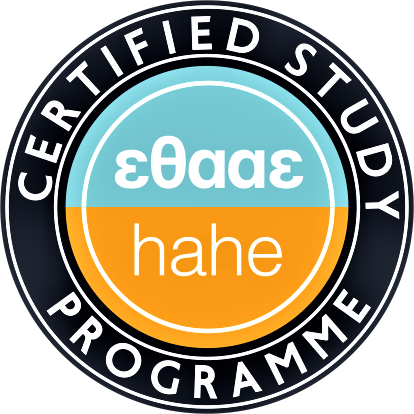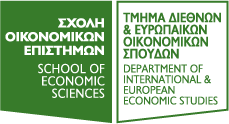Spring Semester 2021-2022
-
Date:31/03/2022 - 15:30 to 17:00
 March 31, 2022
March 31, 2022Title: "Are Nationalist Countries More Protectionist?"
Speaker: Professor Chrysostomos Tabakis, School of Public Policy and Management, Korea Development Institute (KDI)
Host: Professor Panagiotis Hatzipanayotou, Department of International & European Economic Studies, Athens University of Economics and Business
Time: 15.30-17.00
Room: A36
Attachments:
 PDF of Relevant Paper
PDF of Relevant PaperAbstact: We investigate the implications of consumer nationalism for multilateral trade cooperation. Perhaps surprisingly, we show that countries with relatively more nationalist consumers can sustain relatively more liberal trade policies in a repeated-game setting. Moreover, the most cooperative equilibrium tariff of a sufficiently impatient (patient) country is decreasing (increasing) in the level of its consumers’ nationalism. Thus, asymmetric consumer nationalism across countries has a less pronounced anti-cooperation effect, if at all, on the incentives of countries with relatively more nationalist consumers, rather than vice versa. We take these predictions to an antidumping–nationalism dataset and find empirical evidence in their support.
-
Date:07/04/2022 - 15:30 to 17:00
 April 07, 2022
April 07, 2022Title: “Pandemic-Induced Wealth and Health Inequality and Risk Exposure”
Speaker: Dr Spyridon Lazarakis, Lancaster University (United Kingdom)
Host: Assistant Professor Petros Varthalitis, Department of Economics, Athens University of Economics and Business
Time: 15.30-17.00
Room: A36
Attachments:
 PDF of Relevant Paper
PDF of Relevant PaperAbstact: The main waves of a pandemic and subsequent disease outbreaks in the following years influence the evolution of the distributions of health and wealth, leading to differences in the ability to mitigate future income shocks. We study consumption smoothing and precautionary behaviour associated with the main pandemic waves and recurrent outbreak risk in a model in which health and wealth are jointly determined under income and health risk that are related to disease outbreak risk. We calibrate the model to the UK and find that the impact shock of COVID-19 and recurrent outbreak risk amplify existing inequalities in wealth and health, implying persistent increases in wealth inequality that are characterised by increases in wealth for households in higher income groups and/or with higher initial wealth, and decreases for those in lower income groups and/or with lower wealth. These changes lead to inequality in exposure to post-pandemic income risk and, in particular, an increase in the vulnerability of those already with very little wealth prior to the pandemic. We assess public insurance policy to mitigate income losses for those with low wealth and find that, by disincentivising wealth accumulation and incentivising investment in health for those with low wealth and health, it reduces health inequality and, in the short run, the probability of low consumption, but increases wealth inequality and, in the medium run, the probability of low consumption.
-
Date:27/05/2022 - 12:00 to 13:00
 May 27, 2022
May 27, 2022Title: “On the Implementation of Efficient Communication Patterns in Large Economies”
Speaker: Assistant Professor Efthymios Athanasiou, The New Economic School, Moscow
Host: Associate Professor Christos Genakos, Department of Economics, Athens University of Economics and Business
Time: 12.00 -13.00
WEBINAR
Attachments:
 PDF of Relevant Paper
PDF of Relevant Paper Abstact: Agents derive benefit from communicating with each other. In order to communicate they need to have a language in common. Learning languages is costly. Our focus is on environments comprising a large number of agents. In this setting we discuss mechanisms that each satisfies three of the following requirements: Assignment Efficiency, Strategy-Proofness, Individual Rationality and Feasibility. We propose three mechanisms. Each of them, although arguably best in its class, comes short of constituting a viable policy recommendation. Nonetheless, we find that there is some room for public intervention when large economies are involved. This crucially relies either on the capacity of the planner to finance language acquisition, or on the fact that all individuals attach a positive value, even if minimal, to the possibility of communicating.
-
Date:16/06/2022 - 15:30 to 17:00
 June 16, 2022
June 16, 2022Title: "Cultural transmission, ancient trade routes, and contemporary economic activity: Evidence from Australia"
Speaker: Dr. Sotiris Kampanelis, Cardiff Business School, Cardiff University, UK
Host: Assistant Professor Dioikitopoulos Evangelos, Department of Economics, Athens University of Economics and Business
Time: 15.30 -17.00
Room: Α36
Attachments:
 PDF of Relevant Paper
PDF of Relevant Paper Abstact: Can economic outcomes be determined by the transmission of ancient cultural norms and practices? We use the case of colonisation in Australia where Europeans relied on the Aboriginal knowledge of the landscape to explore, map, and settle. Using anthropological data, we construct a newly digitised and georeferenced dataset of all known trade routes that were created by Aborigines based on orally transmitted maps that were passed between generations by word of mouth. We find that Aboriginal trade routes are a strong and positive predictor of contemporary economic activity –as measured by satellite light density at night. We demonstrate that this association can be explained by the early transport infrastructure developed by Europeans along these routes. This suggests path dependence in the trajectory of European settlement and subsequent economic development in Australia.
-
Date:23/06/2022 - 17:00 to 18:30

June 23, 2022
Title: “Stochastic Arbitrage in the Option Market: Survey, Synthesis, and New Results”
Speaker: Professor Stylianos Perrakis, The John Molson School of Business, Concordia University Montreal
Host: Professor Nikolas Topaloglou, Department of International and European Economic Studies, Athens University of Economics and Business
Time: 17.00 -18.30
WEBINAR
Attachments:
 PDF of Relevant Paper
PDF of Relevant Paper Abstact: We show that the stochastic dominance (SD) approach to the valuation of index options in frictionless markets allows the derivation of a unique variance risk premium and price of volatility risk based only on the underlying return and volatility dynamics for a wide class of stochastic volatility (SV) models. The SD approach also derives under similar conditions tight bounds on the admissible option prices in frictionless markets when there are independent jumps together with SV, the SVJ models. We demonstrate numerically by using published results from high profile studies the differences that our volatility risk prices yield in option values in comparison to prices extracted from observed option market data. We also present strategies that allow the profitable exploitation of the differences between model values and observed option market data and out-of-sample tests of the ex post profitability of such strategies in the frictionless world.





